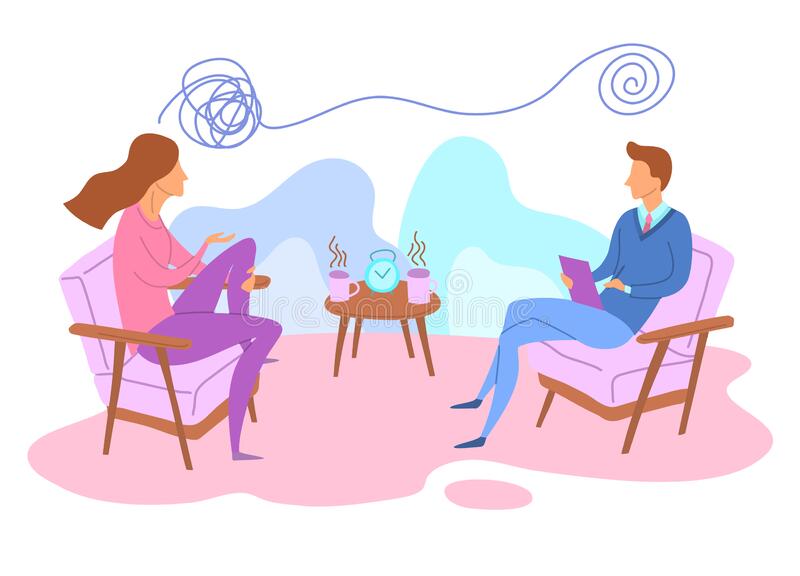When you go to a therapist, what can you expect? What will happen in the first therapy session? This is often a question that people have, especially if they have never been to therapy before. In this blog post, we will discuss what typically happens in the first session and how therapists can help their clients.
Contents
What Is Therapy?

The first thing that you need to understand is what therapy is. Therapy is a process that people use to work through their problems. It is a way to get help from someone who is trained in helping people deal with their emotions and thoughts. Therapy helps you understand your thoughts and feelings and to work through the issues that you are dealing with from a more self-aware perspective.
What To Expect From The First Therapy Session?
The first session is typically an intake session. This is where the counselor will ask you questions about your background, your current situation, and what brings you to counseling. The counselor will also explain their confidentiality policy and discuss what you can expect from counseling. After the counselor has asked you these questions, they will likely give you some information about how they work and what their approach to therapy is. This is a good time for you to ask any further questions that you may have regarding the therapist’s background or demographics, logistics of therapy, or any other doubts you may have regarding the plan of treatment.
After the intake session, the counselor will work with you to develop goals for counseling. These goals will be based on your needs and what you hope to achieve from counseling. Together, you and your therapist will develop a plan for how to best meet these goals. The plan may include weekly sessions, homework assignments, or other activities outside of therapy.
Questions You Can Ask In First Therapy Session
Before starting therapy, it is crucial to get to know some important details about your potential therapist. Some examples can include:

- How many years of experience do you have?
- What are your educational credentials?
- What is the age range of the clients you deal with?
- Do you have any specialization/certification?
- What is your cancellation/refund policy?
- Do you have any references from past clients?
- Are you under therapeutic supervision yourself?
- How can I contact you outside therapy hours?
- Do you provide sliding scale options for financial assistance?
- Are your services provided online or in-office?
- How many clients do you take on at a time?
- Is your approach more theoretical or experiential?
- How long does an average session last?
- Are you inclusive and sensitive towards the impact of systematic oppression in your therapeutic approach?
What NOT To Expect From The First Therapy Session?
There are a lot of myths and misconceptions around the idea of how therapy works. This can have several impacts on the quality of treatment and hamper the way tstrherapy is perceived. Before approaching a therapist, it is important to build realistic expectations and attainable goals from the process.
- The first session will not be like what is seen on TV or in the movies. There will be no sudden breakthroughs or lightbulb moments. In fact, it may feel a little awkward at first. This is normal! The first session is usually just a starting point to get to know each other and begin working towards your goals.
- Therapy is not a quick fix to all life problems. It is a time and effort-based continuous process which requires inputs from the therapist as well as the client. Effectiveness also depends on the client’s willingness to be patient and put in work even outside the therapy room.
- A therapist can not ‘fix’ you. The aim of therapy is not to make you into someone else. It works towards helping you understand and cope with the challenges in a way that works best for you.
- The people causing you problems are not in your therapist’s jurisdiction. They can’t control how others treat you; they can only guide you to cope with the ill-treatment.
- In some instances, your therapist might refer you to another professional. This is done to ensure that your issues get catered to by somebody who has specialized in your areas of concern for the most effective treatment.
- A therapist will not give you advice or instructions about how to deal with your problems. Rather, they can provide you with insights and a new perspective on the problems.
How Does Therapy Help?

Therapists can help you by providing support, guidance, and tools to help you navigate your life. The feeling of unconditional positive regard nurtures the feel of the session and provides for a non-judgemental space for the client. Counselors can provide a safe space for you to explore your thoughts and feelings. They can also offer helpful perspectives and feedback. They help you develop coping skills, learn how to communicate effectively, and manage stress. Ultimately, therapy can help you live a more fulfilling, satisfying, and self-aware life.
Conclusion
The first session is an important time for you and your counselor to get to know each other and develop a plan for counseling. Counselors can help you by answering any questions that you have, developing goals for counseling, and creating a plan to best meet those goals. Remember, the first session is just the beginning of your journey in counseling!
A Word From Therapy Mantra
Your mental health — Your psychological, emotional, and social well-being — has an impact on every aspect of your life. Positive mental health essentially allows you to effectively deal with life’s everyday challenges.
At TherapyMantra, we have a team of therapists who provide affordable online therapy to assist you with issues such as depression, anxiety, stress, workplace Issues, addiction, relationship, OCD, LGBTQ, and PTSD. You can book a free therapy or download our free Android or iOS app.


